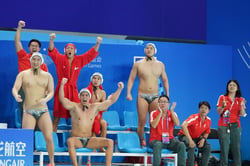Yip Ren Kai: Lessons in Water Polo Standing him in Good Stead in Corporate Life

(Photo: Reddentes Sports)
Reaching a maiden National School Games (NSG) final is a milestone for a student-athlete, for it is the culmination of the hard training and past performances in the earlier rounds to reach this stage.
At the same time, the display at the grand final could make or break the student-athlete in the sporting arena. Retired national water polo vice-captain Yip Ren Kai knew this too well, having experienced the ups and downs in the early years of his water polo journey in secondary school.
As a Secondary 1 rookie freshly enrolled into The Chinese High School (now Hwa Chong Institution) in 1996, he joined water polo as his co-curricular activity. With prior experience as a junior swimmer racing against future Olympians Mark Chay and Gary Tan, his strong swimming fundamentals saw him picked in the school team.
“I suspect I was included in the team because I had a competitive swimming base, so swimming wasn’t much of an issue,” he said.
“In the past, NSG for secondary school was always in March, thus, it meant I had approximately over 2 months of learning to play water-polo before being included in the team.”
Ren Kai recalled his first national schools final where his team came up against Anglo-Chinese School (Independent) (ACS(I)) in the ‘C’ Division boys’ water-polo final at Dover Road on 12 April 1996.
It was a sobering reality check for him as The Chinese High were edged 9-8 by their opponents to lift the championship. With their schoolmates cheering on from the stands in the final, he struggled to get to grips in the pool in that final.
“I don't remember many issues getting to the finals. However, what I was not prepared for, was the supporters from each school cheering on their respective teams,” he continued.
“It would have been my first time being in such a situation where a whole group of schoolmates were cheering the team and myself on.
“I don't recall being able to think much, and the whole situation was a blur. I think the moment sank in when I gave away the penalty for a very fundamental error which lost my school the gold medal.”
Losing the first final is a test of character and mental strength in overcoming adversity as the student-athlete looks to bounce back from defeat.
For the budding water polo athlete Ren Kai, it motivated him to work harder in the pool. As a senior member of The Chinese High ‘C’ Division water polo team the next year, he would lead his juniors in avenging that final loss in the 1997 semi-finals. They would, however, fall short again in the finals against Raffles Institution.
Recounting how he rallied his new teammates to defeat their arch-rivals, he said, “In the next year when I was Secondary 2, I remember us training very hard and staying motivated and helping the new Secondary 1s, knowing that we had another chance of beating them.
“If I recall correctly, we shaved our heads for the finals as well in solidarity. I believe that teamwork was what got us through the same team we lost to in the previous year.
“We recognised that speed would not have been our strongest trait, but we had extra motivation to want to overcome that team because of how we lost to them in the previous year.”
Having come close in his rookie year, Ren Kai would eventually go one better in 1998 as he helped The Chinese High defeat ACS(I) to claim the ‘B’ Division water polo title.
“When I was in Secondary 3, our school coach was also coaching the national youth team, so we would go for extra trainings on Saturday afternoons after morning school training,” he said.
“We managed to clinch the gold medal, beating ACS(I) in the finals and avenging the loss we had when I was in Secondary 1.”
Apart the team championship, his excellence on the pool saw him honoured with West Zone Colours awards in all his four secondary school years. He also won the National Colours awards in 1996, 1998 and 1999.
His early water polo years with The Chinese High would eventually pave the path for Ren Kai to represent Singapore with distinction in the national team. During his seven-year international career, he helped his nation win gold in the sport in the 2005, 2007 and 2009 Southeast Asian (SEA) Games and also featured in the 2002 Asian Games competition in Busan, South Korea.

2007 SEA Games (Photo: Yip Ren Kai)

2007 SEA Games (Photo: Yip Ren Kai)
Looking back at his illustrious playing career, he attributed those years in laying the foundations that would set him up for success in life in and outside the pool.
“I believe the commitment we had for the sport put us in good stead to prepare me for the national team,” he said.
“These experiences of bitter losses and sweet victories in the NSG were what became my foundation in life. It was clear that only through commitment and perseverance that you could achieve what you set out to do.”
Now 40 years young, Ren Kai is currently the co-founder of sports consultancy Reddentes Sports and Executive Director for the World Aquatics Championships 2025 Singapore. He also facilitates workshops preparing athletes for life after sport.
 Ren Kai conducting workshops preparing athletes for life after sports (Photo: Yip Ren Kai)
Ren Kai conducting workshops preparing athletes for life after sports (Photo: Yip Ren Kai)
In an accomplished post-athlete career, he wore several hats in the corporate and sporting world. He served as a member of the inaugural 2010 Youth Olympic Games Organising Committee, team manager of the athletics team in the 2017 SEA Games and general manager of Singapore Athletics in 2018.

He was also instrumental in launching StarHub’s SuperSports Arena channel, focusing on broadcasting local sports content including the NSG, ASEAN Basketball League and the Malaysian Super League when he was in the Content Services, Home Solutions and Content team at the telco.

Ren Kai with Andrea Radrizzani, his former boss, and Mark Chew, co-founder of Reddentes Sports (Photo: Yip Ren Kai)
When asked what the lessons he gained during his competitive years in the pool that helped him in his post-playing career, he gave the following advice, “Firstly, nothing comes easy. Opportunities are there if you would go and fight for it. If you do not fight for it, it will always be a 'what if'. Secondly, every teammate is also an individual. If you were to surround yourself with people of similar personality, the team will not be as effective as compared with a team with different characters and personalities. The key is to work with them to bring out their strengths rather than to expose their weakness. Finally, bouncing back from failure is part of life. You can decide if you would like to give up or if you want to shape up. I chose to shape up.”
Now happily married with two children, Ren Kai is inculcating them the sporting ethos that has served him well in life as an athlete, administrator and corporate executive.
“I believe in exposing my children to as many sports as possible,” he said. “As a typical parent, you always want your child to be the best version of themselves regardless of what they do, so both my wife and I have always been encouraging them and leveraging on the basic sports knowledge that we have, to instill values in sports including sportsmanship, humility, always seeking areas of improvement and being able to bounce back from defeat.”
His daughter appears to have caught the sporting bug and has taken the sporting genes after the man himself.

(Photo: Yip Ren Kai)
“For Mun Hyun, I've been bringing her to multiple sporting events from a young age like swimming, netball, football, rugby and water polo to get exposure to different sports and for her to try her hand at as many as possible,” he added.
“Witnessing our netball girls win a nail-biter against Malaysia at the 2015 SEA Games to clinch the gold medal inspired her to pick up netball."
“It's important to impress upon her that sport is a journey that mimics life and it's something will carry her through past her sporting career."
“I've taught her to learn that whether in winning or losing, there are always lessons to be learnt and how she can improve not only in sport and how it can transcend to life as a student and a young teenager."
Having witnessed both the highs and lows of sporting life as an athlete and sports administrator, Ren Kai has his final words for budding student-athletes who are aspiring and working through the ranks in the national youth squads.
He concludes, “Be proud of what you have achieved to get to where you are. Wear
the national colours with pride.
“You will not always achieve your goal, but never ever do anything that will tarnish the reputation of our nation.”





![ActiveSG Academies and Clubs Logo (Solid Colour)[8647]](https://www.activesgcircle.gov.sg/hs-fs/hubfs/ActiveSG%20Circle%202023Theme/images/ActiveSG%20Academies%20and%20Clubs%20Logo%20(Solid%20Colour)%5B8647%5D.png?width=150&height=65&name=ActiveSG%20Academies%20and%20Clubs%20Logo%20(Solid%20Colour)%5B8647%5D.png)



-01.png?width=200&height=141&name=Team%20Singapore%20Logo%20(Red)-01.png)






.png?width=162&height=60&name=Website%20Events%20Banner%20(1).png)



.png?width=250&height=250&name=COE%20and%20Safe%20Sport%20Workshop%20(400%20x%20400%20px).png)
.jpg?width=250&height=250&name=CQ@Clarke%20Quay%20Poster.jpg%20(400x400px).jpg)
.png?width=250&height=250&name=CCE%2024%20April%20Coaching%20as%20a%20way%20of%20Life%20From%20(400%20x%20400%20px).png)